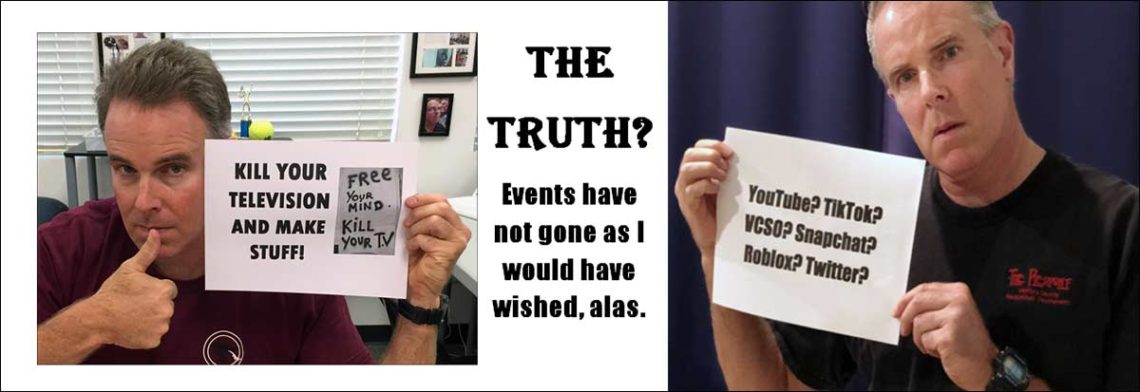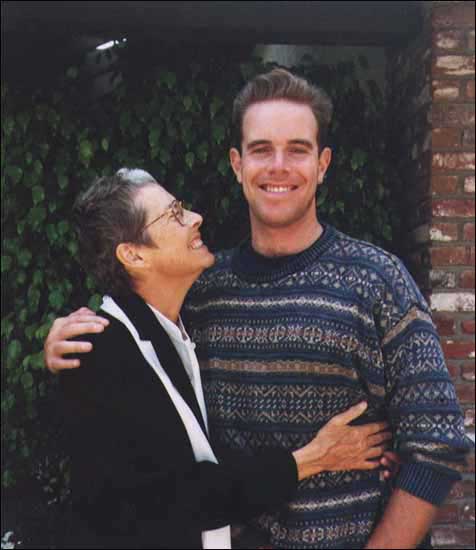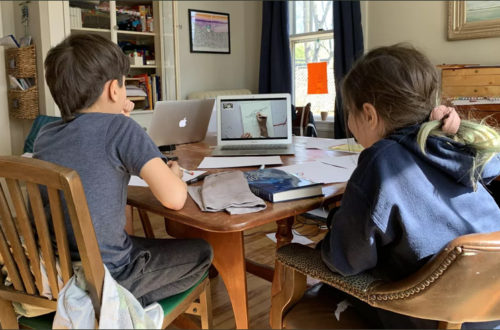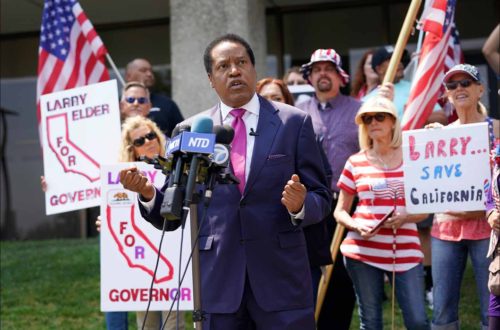Among my friends and family It is a well known story: how I took my TV out to the desert and blew it up with a shotgun.
That was back in 1986. It was a small black and white TV, befitting a college student with no money. But it was a highly symbolic action, and I owed no other TV set for decades. I had thought it out. TV was a giant conspiracy to make my country dumb, so I thought, and I would not have it in my house. I still believe that now. My webpage logs show that my posting on “Kill Your TV” twenty years on has gotten plenty of hits year after year.
“Kill Your TV, Twenty Years Later”
November 13, 2015
But technology seems to have caught up with me and my family. I have been outmaneuvered. While I was fixated on traditional broadcasting through cable TV networks, online social media outlets like YouTube had taken over and changed how America views its media. My unwatched flank was turned, and now I find myself unprepared to fight. My daughters don’t care so much to watch our TV. They watch YouTube on their iPhones and Chromebooks. That sprawling beast, YouTube, has slipped in and taken over my household while I carefully monitored network TV to keep it from doing so.
If I thought TV was dumb, what do I make of social media? Are popular outlets like YouTube and TikTok akin to TV on steroids? Is it the same wine just in different bottles? Can I control YouTube with my daughters in the same way as I control access to our television? I fear not.
All these decades since college I have never had cable TV in my house. My buddies thought it would be hilarious to buy me a TV as a wedding gift back in 2003. So here was the modified deal my wife and I made at that time: we would have a TV, but we would not have cable TV. We would only watch DVDs through Netflix on our TV. This would keep the damn thing from playing an outsized role in our household. My wife and I didn’t watch it much.
And over 17 years later it is the same. We still don’t have cable TV in our house, and my children have almost never seen a television commercial. This was by conscious design. All those clever marketers scheming to find sneaky ways to get at my children’s brains have been thwarted. The maw of capitalism, in all its consumerist trends and pop culture references, has been mostly absent from the childhoods of my daughters. It is one of my prouder parenting moments when I reflect on the fact that my children in their entire lives have hardly seen a single TV advertisement. We have strictly controlled their media diet. No Nickelodeon or whatever. No silly sitcoms hour after hour.
Not so much anymore, however.
We still closely control what our kids have access to on the one flatscreen TV we own. But “TV” has changed. It happened so gradually that I failed to notice. Until it was too late.
Young people don’t watch TV much anymore. But “television” has morphed so that some form of “TV” exists on the many different digital screens in our house. The iPhone or an iPad is now a sort of TV. So are the Chromebooks my daughters use for school. Is YouTube a modern substitute for what cable TV used to be? Access to YouTube is much harder to control for parents than traditional TV broadcasting. There are only a TV or two in each household. But access to YouTube is available almost everywhere on all digital devices. I find it much harder to monitor or control. It is almost impossible.
Here is a telling anecdote. Around January of this year my daughters started talking to me about “Michael” and what he stood for. I asked them, “Michael? Who is Michael? Do I know him?” They informed me they were talking about the Democratic presidential candidate Michael Bloomberg. It quickly became clear to me that the billionaire New York wannabe POTUS was spending millions of dollars on political ads that were played over and over on YouTube. My daughters were watching them constantly. “What?!?” I said to myself in horror. It is exactly this kind of media manipulation I strove so hard to protect my daughters from — and now it is happening anyway. Mike Bloomberg is having these one-sided conversations with my daughters without me knowing it? He is paying millions of dollars for access to my daughter’s brains? I immediately got a YouTube Premium family account so my daughters would have no commercial advertisements played to them.
It was a real parenting moment for me.
I had been so focused on controlling what came across our TV on network TV that I had been oblivious to what was playing on their iPhones over YouTube. While I had been watching for unwelcome intruders entering the front door, and they had come in through the back window.
TV is not so much the enemy of parents nowadays. Or maybe it is more to the point that “TV” has now morphed into the many smaller screens that young people watch throughout the day. Maybe cable TV has more or less been eaten and absorbed by YouTube, the cultural medium of the next generation. And it has taken over.
And TikTok and Instagram and VCSO and Twitter and Snapchat and whatever else — wait a bit and there will be a slew of new ones.
Network TV might have looked like a “vast wasteland” of banal stupidity back when I was growing up. But when I look at the viewing history on YouTube for my daughters, it looks to be populated by the same mindless muck.
Most of it is harmless enough stuff that pre-teens might watch. Almost all of it, in fact.
But my daughters watch it for hours and hours, even as I control the TV strictly.
I have put limits on their devices so they can only watch two hours of YouTube per day on their digital devices. My younger daughter (10-years old) bitterly rebels against even this moderate measure. She complains vehemently to me, “I am the only person I know who has these screen time limits! All my friends have completely unrestricted access to technology! They can watch whatever they want all day long! They watch Netflix movies on their iPad at one in the morning!” My daughter was irate. But I will not relent. She can watch whatever the child-safe technology lets her watch on YouTube, but there will be limits. My wife and I put those limits in place. We are the parents; we will decide. As she gets older, she will have more freedom. But for now it will be limited. My daughters cannot eat ice cream all day long. They cannot stay up all night, or stay out until midnight. And she cannot live in front of a screen 24/7 watching pixels dance to and fro.
Enough.
When I was a child my parents put limits on my TV viewing. Sunday through Friday afternoons (school nights), I could not watch TV; only on the weekends could I watch whatever I wanted. As an adult I am happy my parents did not let me watch so much TV that it would turn my brain to guacamole. If they had let me, I probably would have watched TV non-stop. But I did not have unlimited access to the anodyne which was TV; so instead of turning my brain off and turning on the TV to be “entertained,” I engaged my imagination and read books or did whatever. Well done Maggie and Dick Geib! That was good parenting. I am trying to do the same. But as the technology landscape has grown more complex, a parent’s job to monitor it has become more difficult.
Should I ban YouTube and TikTok on my children’s digital devices on school nights? A digital detox Sunday afternoon through Friday afternoon? Alas, there might be a revolution in my household. YouTube seems to have a strange cultural power for them. My younger daughter reverently tells me, “He is a YouTube influencer! He has one million followers!” It is as if a person could do nothing more significant in life than be popular on YouTube. Ban YouTube on weekdays and allow it only on weekends? To restrict their technology so much as teenagers might be to go too far. Parents pick their fights. That would be a bridge too far, my gut tells me. I will avoid that fight. Save my parental authority for another day.
Even without commercial advertisements on her YouTube account, my daughters are picking up cultural messages through all the hours of watching these videos. This summer my older daughter (13-years old) talked about Black Lives Matter, President Trump, Coronavirus restrictions, and other burning issues of the moment. “Where are you getting your information from? Who is telling you that?” I asked her. It became evident that the online youth culture of YouTube was her touchstone.
She is getting her cultural commentary from YouTube? Her politics from YouTube “influencers”? I was a bit horrified. More than a bit, to be honest.
I sat her down and urged her to do independent research. I said, “The world is a complicated place, and when you look at controversial topics you want to look at complexity. Go beyond YouTube videos or sweeping generalizations made in a minute or two on social media. Go to Google and research it yourself. Read closely and examine both sides of the issue. Especially research the opinion you think you disagree with. Think about it, and then think again. Look to the complexity.” Go to Google and search and then search again. Buy books on the subject and read them closely. Talk to me. Go read more articles and more books. Speak with others who know what they’re talking about. Seek out and talk respectfully face-to-face with those who disagree with you. Especially do that. It is in disagreement where one sharpens one’s thinking.
It seems the algorithms of YouTube seek to work against this sort of complicated and extended thinking. They want to put you in touch with people who agree with you — and the most extreme voices tend to be the ones which get the most attention, and that is by design — “if it’s outrageous, it’s contagious.” This is how social media companies like Twitter try to hold your attention with drama, keep you on their site to see the action, and thereby make money from advertisers. It is by clever and conscious design highly-addictive; the big tech company overlords don’t let their own children dabble with this digital heroin, and for good reason. Will my daughters make it out of the “echo chambers” that so dominate online discourse? The “outrage culture” which so diminishes and cheapens dense and deep thinking?
So much emotional sloganeering, so little nuanced reasoning. I would that my daughters could rise above all that. They deserve better. We all do. The nastiness of this reality-TV social media ecoscape is Donald Trump as President of the United States, as well as his many vicious online opponents. They are the twin sides of the same coin: hostility and negativity. Yuck.
Can I keep all this unhealthiness away from my daughters? The spirit of meanness and cheap shots? Alt Right and Antifa? Low-rent low-lifes. Sucker punches and “flame wars.” Internet trolls and “deplatforming.” Illiberalism and intolerance on both sides of the political spectrum. You are “with us or against us” binary thinking. Extremism and populism. Horrible.
For almost a decade I was able to control the media diets of my daughters. They were infants who turned into toddlers who then became little girls. It was the age of innocence, relatively speaking. It was almost all classical music and famous children’s literature. Because this is what my wife and I thought healthy and important. Because this is what we esteem and enjoy.
But especially with this pandemic and the closure of almost all normal activity for kids, they have spent more time online than ever before. In their rooms alone. On YouTube. Watching hour after hour of online videos. Reading the comments viewers make on them.
And I cannot control it so much anymore.
I guess for better or for worse YouTube, TikTok, Twitter, Instagram, and the others are the media culture my daughters will grow up in. It will have its say. The youth trends of their cultural moment will exist, whether I like it or not. It was not so different as when I was growing up. Kids will be kids.
But nature abhors a vacuum, and if I let it YouTube will have the final say. To the extent I don’t do the parenting, some other influence will.
All I can do — like my father before me — is to try and be a part of the conversation. I can give perspective and guidance to my daughters through long talks in complicated conversations about the world and their place in it.
With teenage daughters who are often resistant to spending time with their “old man,” this is easier said than done. My daughters will want to know where their parents stand on the controversial issues of the day. But they don’t want to hear them give another lecture. It is complicated. I need to reach out and try to talk with my daughters, even when they push me away. It will not be easy.
But the “cat is out of the bag,” so to speak. My daughters are out in the wider world. I still believe in “Killing your TV.” But “TV” is not what it used to be. It metastasized. “TV” changed into something more sneaky. It is more varied and ubiquitous. I cannot take away my daughter’s iPads and Chromebooks, or their online access. That’s not going to happen. I cannot “kill” YouTube and TikTok. I don’t think I would, even if I could. And I can’t take away my daughter’s iPhones forever. That would be throwing out the baby with the bathwater.
Maybe I need to let go of trying to “control” an often unhealthy political and cultural milieu which exists just outside our front door. Sooner or later, my daughters must confront it, I guess. It is the world they must grow up and live in, after all.
My daughters are beyond me.
Perhaps I have lost.
Has “TV” won?
P.S. To be completely honest, I watch YouTube, too. My daughters are not alone in this. Almost every evening as the day approaches its close I sit down in front of the TV. I call up one piece of classical music or another, sit back and close my eyes, and listen and relax. Sometimes I also watch highlights from pro tennis matches – or whatever the algorithm the YouTube programmers developed think I would like. Even more than traditional network TV broadcast networks, YouTube has a VAST amount of content available. Plenty of dreck, lots of bad, tons of mediocre, and some good and very good offerings, too. Caveat emptor! Maybe the question should not be so much “Are you watching YouTube?” but “What are you watching on YouTube?” And this was the same question posed with watching network cable TV. So have things really changed that much?
A few years later…
“Murderous Avian Flu and Locking Down Schools in Florida”
March 24, 2023






One Comment
Jay Canini
If anything YouTube, Facebook, etc has gotten worse than TV of the 80s and 90s, and in my opinion its older adults who are susceptible to this brainwashing the most even though they were the ones in the 2000s saying “be careful what you read on the internet”.
There are older adults who consume propaganda posted on Facebook by people who they dont even know the identities of, and if you try to give a nuanced breakdown/explain things they can block you and return to ignorance. Ignoring those older adults is no longer an option because they’re being shaped by the propaganda they consume (some of which is now trying to say “the US is a republic and not a democracy”) and they vote.
Social media platforms need to be regulated as media companies, forced to:
* Provide a “balanced diet” based on algorithms
* Block extreme content outside of the overton window
* Forced re-friendings/unblockings (if Guy A constantly posts rebuttals to extreme politics in a civil manner and Guy B unfriends/blocks Guy A, social media should force Guy B to refriend Guy A and explicitly tell Guy B that he’s being brainwashed)
And now that social media has become so ingrained, it may become necessary for national security reasons to sabotage “alternative” networks trying to move the overton window to an extreme place (we have the First Amendment but it doesn’t mean “a group” with the blessing of the government can’t sabotage a pro Nazi network).